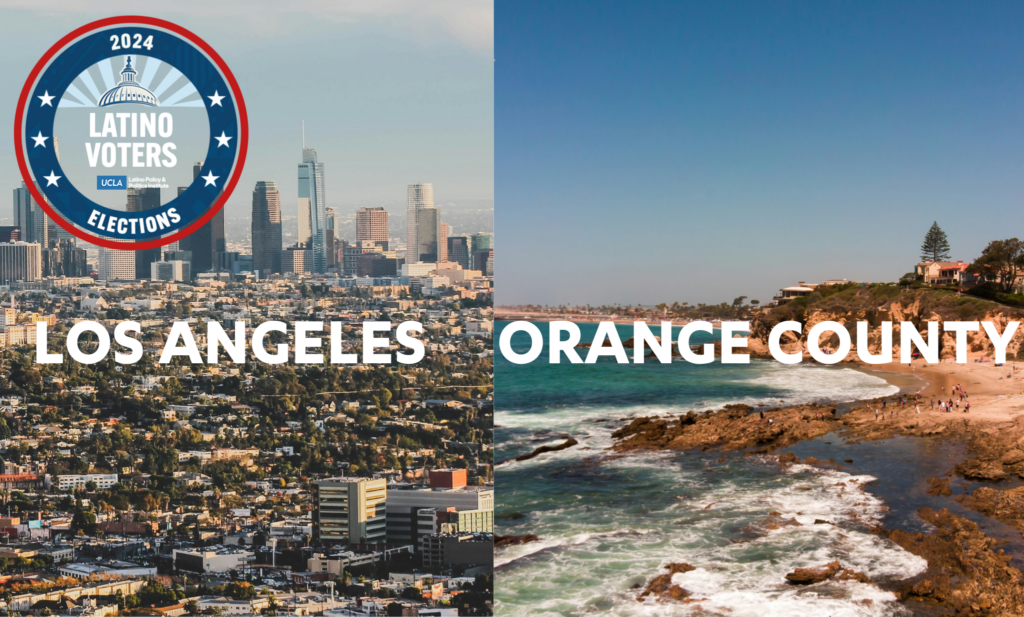FOR IMMEDIATE RELEASE
Contact: lppipress@luskin.ucla.edu
New UCLA LPPI Data Briefs Take a Deeper Look at Latino Voters in Los Angeles and Orange Counties
Latino voters in LA and Orange counties are crucial to control of the U.S. House
LOS ANGELES (August 27, 2024) — The UCLA Latino Policy and Politics Institute (UCLA LPPI) released two new data briefs focusing on Latino eligible voters in Los Angeles and Orange counties. The untapped electoral potential of the Latino electorate in these two counties will prove crucial to controlling the U.S. House of Representatives, with 23 districts up for grabs between the two counties.
Key findings from Los Angeles County: A Democratic Stronghold with a Growing Latino Population
- The Latino population is growing more rapidly than non-Latinos and accounts for more than 40% of eligible voters—making them the largest racial or ethnic group.
- Latino eligible voters in Los Angeles County are younger than eligible voters as a whole. Young voters ages 18 to 24 are more diverse than all eligible voters, and Latinos’ share among young voters is 18 percentage points higher than their share among the overall electorate.
- Investing in Spanish-language outreach will be key to reaching Latino voters in Los Angeles County. More than half of all Latino eligible voters in Los Angeles County are bilingual, and an additional one in five only speaks Spanish.
- Most Latino eligible voters in Los Angeles County are U.S.-born, but a sizable share (29%) are naturalized citizens.
The brief also shows that in Los Angeles County, Latino eligible voters have lower levels of formal education. Additionally, Despite their strong presence in the workforce, Latinos earn the lowest hourly wages and are predominantly employed in retail, while being underrepresented in professional services and waste management industries. Housing challenges are also significant, with 48% of Latino renters burdened by housing costs, and they are 10 percentage points more likely to live in overcrowded conditions compared to the county average. The findings also demonstrate that Latinos face the highest uninsured rates among major groups, yet have good access to digital connectivity and transportation, with most having internet access, smartphones, and vehicles.
Read the full brief on Latino voters in Los Angeles County.
Key Findings from Orange County: A Mainstay of Evolving California Politics
- The Latino population in Orange County is growing more rapidly than the non-Latino population and accounts for more than one quarter of all eligible voters—making them the second-largest eligible voter group after non-Hispanic whites. Orange County also has a larger Asian and Pacific Islander eligible voter population than the state overall.
- Latino adults in Orange County are significantly younger than eligible voters as a whole. Young voters ages 18 to 24 are more diverse than all eligible voters, and Latinos’ share among young voters is about 18 percentage points higher than their share among the overall electorate.
- Investing in Spanish-language outreach will be key to reaching Latino voters in Orange County. Almost half of all Latino eligible voters in Orange County are bilingual, and almost one in five only speaks Spanish.
- Most Latino eligible voters in Orange County are U.S.-born, but a sizable share (25%) are naturalized citizens.
The brief also shows that Latino eligible voters in Orange County, while having higher levels of formal education compared to the state overall, still face significant challenges. Twenty-one percent lack a high school diploma, and they have the lowest rates of bachelor’s degree attainment at 23%. Similar to Los Angeles County, Latinos in Orange County earn the lowest hourly wages and are overrepresented in retail trade and the arts, entertainment, and hospitality industries. Housing issues are prevalent, with a high proportion living in overcrowded homes and 48% of Latino renters facing housing cost burdens. The findings also show that Latinos have the highest uninsured rates among major racial or ethnic groups and the vast majority have access to the internet, a smartphone, and a vehicle.
Read the full brief on Latino voters in Orange County.
See additional briefs as part of the 2024 election research series here.
###
About UCLA Latino Policy and Politics Institute
The UCLA Latino Policy and Politics Institute is a non-partisan research institute that seeks to inform, engage, and empower Latinos through innovative research and policy analysis. LPPI aims to promote equitable and inclusive policies that address the needs of the Latino community and advance social justice. latino.ucla.edu.











